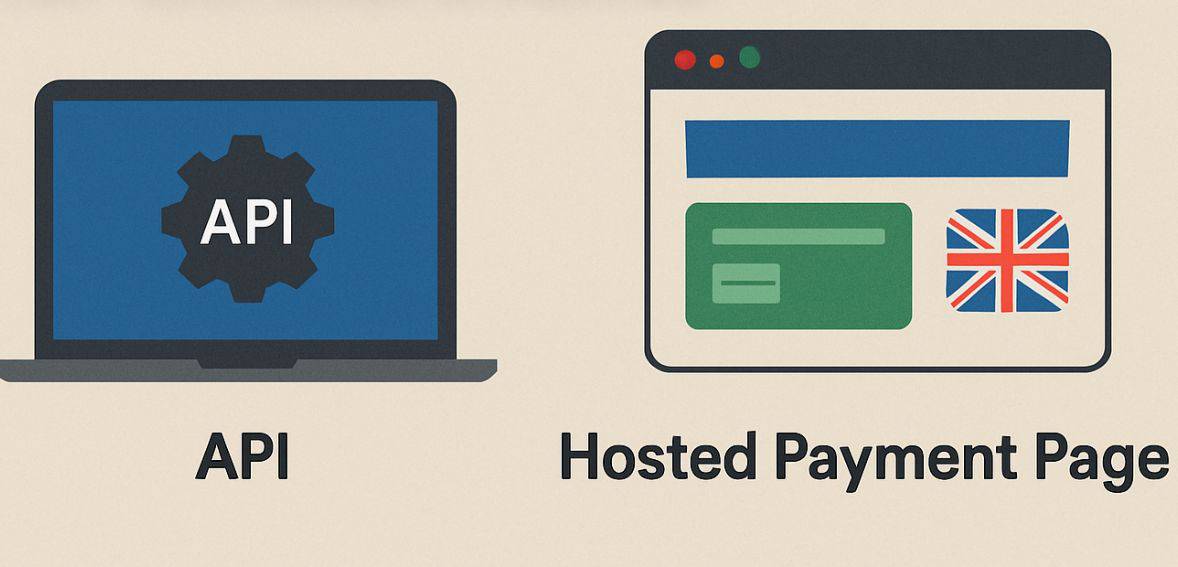
By Crystal Hopkins August 10, 2025
UK merchants are continuously making choices that affect how customers perceive their businesses in the quickly digitizing retail landscape of today. Selecting the appropriate payment integration is arguably one of the most important yet underappreciated of these. Even though customers only see a well-designed checkout screen, the technology that powers it—whether hosted or driven by an API—has a big impact on security, control, conversion rates, and, eventually, customer trust.
API integration and hosted payment pages have become the two most popular integration techniques in the UK payment processing market, despite the fact that there are many other options available. Navigating these technical options without becoming overwhelmed is a challenge for merchants. Aligning your checkout process with your brand, business model, and legal requirements is more important than simply having payment functionality.
When setting up an online checkout process, one of the key decisions for UK merchants is choosing between API vs. Hosted Payment integrations. Each option offers distinct advantages in terms of customization, security, and ease of implementation.
Understanding API Payment Integration in the UK Context

By integrating payment functionality straight into their website or app, an API payment integration allows merchants to completely customize the checkout process. APIs give you the ability to manage everything from branding to data collection in the UK, where a lot of customers expect a flawless digital experience, particularly on mobile devices.
This integration model is appropriate for companies that collaborate with a development team or have technical resources. Since the merchant’s infrastructure may be handling or storing payment information, it necessitates greater involvement up front, including PCI DSS compliance. Under UK laws and the GDPR framework, where protecting consumer data is crucial, that is a major factor.
However, the benefit is a smooth, consistent payment experience that remains in the business’s online space. Because it lowers checkout friction and can boost conversion rates—particularly crucial in high-cart-abandonment industries like fashion, electronics, or subscriptions—UK e-commerce brands place a premium on this.
More sophisticated features like split payments, recurring billing, and integrated loyalty programs are also made possible by APIs, which give UK merchants a competitive edge in markets where client retention is crucial. However, this degree of control carries responsibility: the merchant is in charge of system dependability, security updates, and compliance maintenance.
The Hosted Payment Page: Plug-and-Play Peace of Mind

Conversely, hosted payment pages are a stress-free option, particularly for smaller UK merchants or those without technical staff. Customers who choose this option are redirected to a secure payment page that is hosted by your payment provider. Card data is eliminated, and PCI DSS and other compliance requirements are significantly lessened.
These plug-and-play setups are offered by well-known UK providers like Worldpay, Stripe, and Square. They also come with branding options so that the customer still feels like they own it. Strong security, ease of use, and quicker deployment come at the expense of some control.
Because of this, hosted pages are ideal for pop-up companies, independent merchants going digital, and anyone else looking to launch rapidly without establishing a tech stack. While maintaining a mobile-friendly design and recognizable checkout processes, the system manages security, updates, and support.
Actually, a lot of UK consumers have faith in hosted payment pages, particularly when they see recognizable logos or security icons. It feels safe, which can be consoling in a time when worries about fraud are on the rise.
Control vs. Convenience: What’s More Valuable for Your Business
One crucial question lies at the core of the choice between hosted integration and APIs: Do you prefer convenience or control? If your company’s success depends on personalization, branding, or in-depth knowledge of how customers use your checkout, API integration provides unparalleled flexibility.
However, there are additional expenses, longer turnaround times, and the requirement for technical maintenance. On the other hand, hosted pages are all about minimalism. They simply function, even if you can’t adjust every pixel. That trade-off is more than worthwhile for a lot of new or smaller businesses in the UK, particularly if it means reaching the market more quickly and maintaining security with less work.
Here, there is no one-size-fits-all answer. The most important thing is to align your decision with your company’s objectives, available resources, and what
Security Expectations in the UK Payments Environment

Security cannot be compromised, particularly in the UK, where laws like PSD2’s Strong Customer Authentication (SCA) are forcing companies to implement more stringent fraud controls. Customers want assurance that their data is secure, but they also expect transactions to be seamless.
You can incorporate SCA protocols with flexibility thanks to API integrations, but it’s your responsibility to make sure they’re implemented correctly. Although it requires more effort, you have more control over how those protections are put into place. In contrast, these features are built into hosted pages.
For merchants who would prefer not to worry about the technical details, the provider simplifies compliance, encryption, and regulatory updates.
The UK GDPR adds yet another level of complexity, particularly as merchants increase their online presence after Brexit. Payment data collection and storage, even for a short time, must now follow established procedures. The provider is primarily in charge of managing this compliance for hosted solutions.
Technical audits and strong internal processes are necessary for API-driven merchants. This is the only reason why a lot of UK-based startups choose hosted solutions to reduce risk until they develop into a model where custom API integration makes sense.
UX and Checkout Flow: Do UK Consumers Notice the Difference
Tech-savvy British customers are impatient with complicated checkout processes. They desire quick, transparent, and safe transactions, whether on a desktop, tablet, or mobile device. What impact does integration choice have on their perception, then? The customer journey remains inside your ecosystem when you integrate an API.
The checkout process is quick and seamless, just like the rest of your website or app. There is no pause or redirect. Higher conversion rates are frequently the result of it feeling cohesive. In contrast, hosted pages no longer feel awkward. These days, many provide customizable branding, support for local languages, and layouts optimized for mobile devices.
Customers hardly notice the handoff when it’s done correctly. Indeed, it can boost confidence to see well-known names like Visa, PayPal, or Mastercard at the point of sale. Ultimately, what consumers do notice is whether your checkout feels secure and reliable. A poorly implemented API flow—one that’s buggy or slow—can do more harm than good. Hosted solutions may lack full customization, but their built-in trust signals can win over even the most cautious buyer.
Integration Speed and Time-to-Market

Speed is crucial for UK merchants looking to get off to a quick start, perhaps during a flash launch or seasonal sale. And hosted payment pages excel in this situation. Many providers offer plug-ins, wizards, and transparent dashboards, making it possible to get started in a matter of hours.
This quick setup allows you to get started right away, whether you’re testing new product lines, launching an MVP, or operating a pop-up shop. Integrations with APIs are more complex. Development, testing, quality assurance, and compliance checks will take time. It will take a few weeks before you are prepared to launch, particularly if your checkout requires additional logic for subscriptions, discounts, or international payments.
The compromise? Although they take longer, APIs offer you more control and long-term scalability. Although hosted pages are quicker, they are less customizable. Your timeline and growth plans should guide your choice.
Support and Documentation Quality
The quality of the payment processor’s documentation and support is crucial to the success of either integration method. Clear technical documentation, developer forums, and sandbox environments are essential for UK merchants utilizing API integration. Even seasoned developers may encounter delays or compliance errors in the absence of thorough resources.
Users of hosted payment pages frequently rely more on human assistance than on documentation at the code level. Non-technical merchants can go live with few disruptions if they use providers that offer live chat, 24/7 customer support, or onboarding assistance. Poor service can undermine trust and result in expensive delays in the UK, where support expectations are high.
As businesses scale and evolve their payment infrastructure, it’s vital to understand the unique obstacles of SaaS payment processing challenges—including managing recurring billing, ensuring global compliance, and maintaining system reliability. This insight helps UK merchants build resilient, long-term payment strategies.
Cost Implications and Scaling Concerns: API vs. Hosted Payment

Due to PCI compliance requirements, API integration necessitates initial development expenditures, continuous maintenance, and potentially increased insurance or audit fees. But over time, it may provide a higher return on investment, especially for UK companies with complicated billing requirements or high transaction volumes.
Lower upfront expenses and fixed monthly fees are common features of hosted payment pages. This model works well for companies that don’t have in-house development or that prioritize cash flow. Additionally, it scales well with little additional work. Merchants should, however, pay careful attention to transaction fees.
On hosted platforms, the cost per transaction can occasionally be a little higher, especially if the provider provides value-added services like customer service or fraud prevention. This marginal cost difference can add up for UK merchants with high volume. It’s wise to project growth and evaluate how costs shift over time, especially if moving from a hosted solution to an API integration is part of a longer-term strategy.
Conclusion
Choosing between hosted payment page integration and API is a strategic decision for UK merchants. For companies prepared to handle the responsibilities, API integrations provide deep analytics, control, and customization. For businesses that value simplicity and compliance, hosted pages offer convenience, speed, and security.
The correct payment integration can increase customer trust, boost conversions, and streamline operations, regardless of whether you’re managing a small online business or expanding a large national retail chain.
Spend some time assessing your technical capabilities, clientele, and expansion goals. How you accept payments is a customer experience strategy, not just a technical choice, in today’s competitive market.